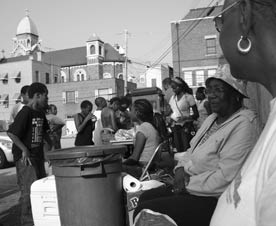In the Wake Of Kelo
In 2005, the Supreme Court ruled in Kelo v. New London that the economic development generated by a new Pfizer plant and luxury homes would be sufficient reason for New London, Conn., to invoke eminent domain to take nonblighted residences. This touched off a firestorm of anti-eminent-domain activism and legislation nationally. What had once been mostly the concern of hardcore property-rights advocates received an infusion of support from both the left and right wing, and dozens of states passed restrictions on the use of eminent domain, especially on the transfer of condemned property to private owners. The campaigns supporting these measures often featured stories of small-business owners like Whitman, who lost their premises to redevelopment projects.
But this movement also generated concern among local development officials and community-development groups that extreme remedies for extreme cases were going to block the use of eminent domain in other situations. Public-private partnerships to renovate apartment buildings once owned by slumlords, for example, would be prohibited under laws meant to prohibit transfer of condemned property to a for-profit company if a private nonprofit ended up owning the building. Limits on invoking eminent domain for redevelopment could stymie grass-roots community-redevelopment plans if one absentee owner of a vacant property refused to sell.
Pratt’s Shiffman, who supports the community’s stance that eminent domain should not be allowed for Columbia’s project, worries that emotional reactions like these to actual abuses of eminent domain will make it difficult to use it as a tool in the future to implement true grassroots-supported plans or to mitigate the harm of absentee or neglectful ownership. “I’m a supporter of eminent domain,” he explains, “but it should go through a public process, and start with a city plan. It shouldn’t start from a private developer. That weakens it when you need to use it for a true public purpose. I’m afraid over time we’re legitimately going to need it and we’re not going to have it.”
New York State has so far not passed such restrictions. But in New York City, Columbia’s expansion, along with the Atlantic Yards and Willetts Point developments, are fanning the flames of anti-eminent-domain sentiment and perhaps helping to create a constituency for such legislation. “We are totally, totally, totally against eminent domain,” says Reyes-Montblanc, former chair of Community Board 9. “Most states have awakened to [eminent-domain abuse] and taken corrective action.” Reyes-Montblanc echoes many in CB 9 when he says he supports restricting eminent domain to more traditional public-use cases, such as roads, public schools, and hospitals.
Karen Phillips, a founder of the Abyssinian Baptist Development Corporation (a Harlem community development corporation) and the lone dissenting vote against Columbia’s proposal on the city planning commission, also finds this worrisome. “A lot of people want to say ‘I’m really against eminent domain.’ That’s not a realistic approach for anyone who wants to participate in comprehensive planning,” she says. Even preventing condemned property from going to a private entity is problematic, she notes: Community developers are private entities. Phillips says that instead, local officials should hold to a standard of “public benefit” where a project for which eminent domain is invoked must itself serve the whole community, not just come with concessions from the developer to fund attractive extras.
Shiffman agrees, saying that relying on negotiating a community-benefits agreement before decisions about land use and zoning are finished amounts to “purchasing” planning decisions. He says he was angry to see Columbia’s attention shift almost entirely to the local development corporation that was negotiating the community-benefits agreement for this expansion while the community board was still trying to discuss resolving differences in their zoning proposals.
Defining when a project is generally beneficial to a neighborhood and its existing residents and businesses is no easy task, not to mention balancing a neighborhood’s needs with those of anchor institutions and cities and regions at large. There will likely always be disputes, but one important step to achieving a more progressive, fairer result than in Manhattanville will be to shift the balance of power in the negotiations, says Phillips. Rather than fighting to be heard, “the community should be in a stronger role to negotiate for what they want from the private sector � and the public sector,” she says.
Going Forward
The city council was expected by many to address Columbia’s plan and the amended 197a plan in mid-January, but in a surprise move that prompted accusations of trying to avoid further public debate, the plans were brought to a vote in mid-December. Both plans were approved, though some council members noted that they appeared to conflict.
In the wake of these decisions, the remaining property owners could decide to negotiate sales with Columbia after all, giving a somewhat anticlimactic go-ahead to the expansion. Or they could, as some have threatened, go to court to try to keep their buildings. In either case, community activists, planners, and the community board will continue to try to affect, adjust, or redirect what they consider the worst aspects of the plan.
And in either case, West Harlem will change dramatically over the coming decades, possibly in ways predicted by community activists, possibly in ways predicted by Columbia, likely some of both. What exactly it will look like remains to be seen, but those concerned with the relationship between cities and their institutions of higher education, and with the search for a fair and progressive approach to eminent domain, will be keeping a close eye on its progress.




Comments